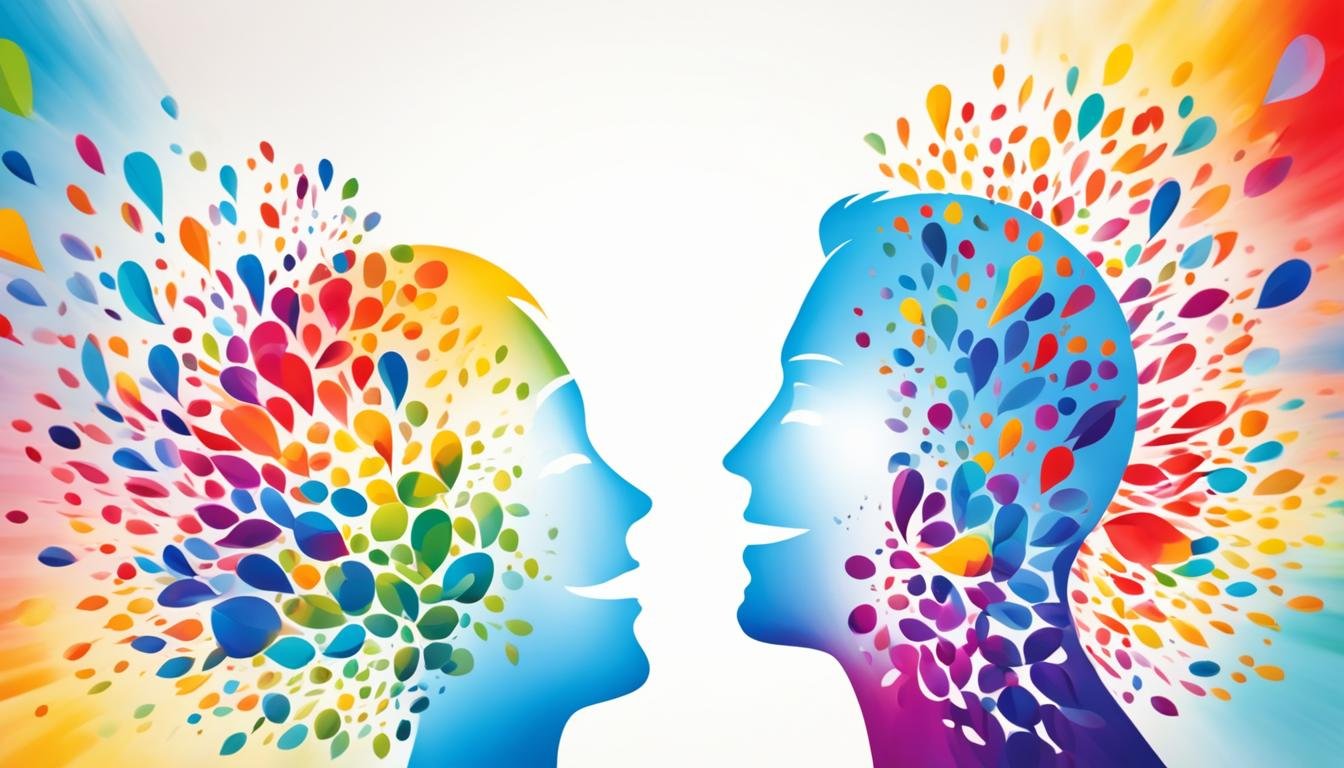Being in tune with your partner is key for a strong relationship. When you and your partner feel the same emotionally, your bond grows stronger. But, many couples have trouble understanding what the other needs or feels. So, it’s vital to connect with how your partner feels inside.
By getting to know their emotional needs, you can show you care. This helps avoid fights and can even stop affairs. This deep understanding is the foundation for your relationship to thrive.
Key Takeaways:
- Understanding your partner is crucial for a successful relationship.
- Tuning into your partner’s emotional needs fosters connection and harmony.
- Understanding their core emotional needs makes your partner feel valued.
- Resonating with your partner’s emotional frequency prevents conflicts and misunderstandings.
- Building understanding can strengthen trust and prevent infidelity.
The Importance of Emotional Resonance Frequency
Understanding your partner’s emotions and needs is crucial for a strong relationship. This understanding deepens your connection. When you meet their emotional needs, they feel valued and important.
This deep understanding is vital for a relationship’s success. It creates a lasting bond. Recognize your partner’s emotional needs to build a connection that lasts.
Many couples face challenges in this area. They might guess their partner’s needs, which leads to problems. It can cause fights and hard feelings in the relationship.
It’s vital to really listen and understand your partner’s emotions. By doing this, you build a relationship based on love and mutual understanding. This helps avoid common relationship issues.
The Key Components of Emotional Resonance Frequency
To maintain a strong emotional connection, you should focus on three things:
- Understanding: Take time to know your partner’s deep emotions and desires. Listen carefully and show you want to understand. This forms a strong emotional link.
- Empathy: Imagine what your partner is feeling. This lets you provide the right kind of support. Empathy helps create a caring place for both of you.
- Communication: Good talk is key to keeping your emotional connection strong. Share your thoughts openly, and encourage them to do the same. This builds trust and keeps you emotionally close.
“Emotional resonance frequency is the key to creating a deep connection and long-term success in a relationship.” – Dr. John Gray
Investing in these areas can help your relationship grow. You’ll both enjoy a deep emotional bond. This leads to a happy and fulfilling relationship.
Effective Communication and Emotional Intelligence
Understanding your partner deeply relies on good communication. It’s not just about talking. It’s also about listening well, showing empathy, and being emotionally aware. Listening actively means really hearing what your partner says, connecting with their thoughts and feelings.
Active listening means giving your complete attention, keeping eye contact, and using positive signals like nodding. These show you’re involved in the talk. You have to ignore distractions and focus on what your partner is saying.
“Active listening is about being present in the moment, creating a safe space for your partner to express themselves without judgment.”
Empathy’s key to good talks too. It’s about understanding your partner’s emotions and experiences. When you empathize, you let them know their feelings matter to you. It shows you’re truly interested in their well-being.
Then there’s emotional intelligence, crucial for understanding and expressing emotions well. It lets you handle your own feelings and respond to your partner’s with care. With emotional intelligence, you can prevent conflicts by being aware of each other’s emotional states.
“Emotional intelligence helps build bridges of understanding and creates a deeper emotional connection with your partner.”
Improving these communication skills helps you bond better with your partner. Good communication creates understanding, trust, and intimacy. It lays a strong foundation for a happy, fulfilling relationship.

Exploring Love Languages and Relationship Dynamics
Understanding your partner leads to a strong bond. Love languages show how we express and feel love. Knowing your partner’s love language helps you love them better, building a deeper connection.
There are five main love languages: Words of Affirmation, Acts of Service, Receiving Gifts, Quality Time, and Physical Touch. Everyone has a main love language. For instance, if your partner loves Words of Affirmation, saying nice things means a lot to them.
Relationship Dynamics: Power and Attachment Styles
Relationship dynamics are crucial. They deal with power balance and how people connect. Understanding these dynamics is key to having a healthy relationship.
Power dynamics show who has more control in a relationship. It’s important for both partners to feel equal. This makes the relationship fair and respectful for both.
Attachment styles affect how we act with our partner. There are four types: Secure, Anxious, Avoidant, and Disorganized. Knowing your partner’s attachment style helps you support them better. This leads to a strong and loving connection.
| Love Language | Description |
|---|---|
| Words of Affirmation | Verbal expressions of love, appreciation, and encouragement |
| Acts of Service | Actions that show love and support through helpful deeds |
| Receiving Gifts | Thoughtful gestures and presents that symbolize love and care |
| Quality Time | Undivided attention and meaningful time spent together |
| Physical Touch | Physical affection that creates a sense of connection and closeness |
By learning about love languages and relationship dynamics, couples grow closer. Understanding and valuing each other’s needs is the key to a happy relationship. This creates a space where both partners feel loved and supported.
Conclusion: Fostering Understanding in Relationships
Understanding someone takes trust, patience, and work. Trust is key for talking openly and honestly. It makes a safe place for both to share what they think and feel. With trust, emotional bonds grow and relationships become stronger.
To build emotional bridges, listen actively and show you care. Listening to what your partner says and feels means you respect them. Empathy lets you see things from their side and respond kindly. Understanding what they need makes your connection deeper, showing you care about their feelings.
Dealing with arguments well is critical. Everyone fights, but dealing right with these fights helps your relationship. Good arguing means talking openly, looking for ways to agree, and solving the problem together. This way, both get what they need without anyone losing.
Always strive to understand what your partner thinks and feels. This work helps you two build a great relationship with respect. It’s a journey together, facing life’s challenges and joys. With time, you’ll see the deep bond you’ve created.
FAQ
How can I understand my partner better?
Why is emotional resonance frequency important in a relationship?
How can I improve my communication skills and emotional intelligence?
What role do love languages and relationship dynamics play in understanding my partner?
How can I foster understanding in my relationship?
Source Links
- https://medium.com/@joshuacampbell/what-makes-a-relationship-tick-fc7f13c8e20a
- https://intermissiontherapies.com/what-makes-them-really-tick-series-your-partner-and-you-are-like-two-instruments/
- https://dailyplateofcrazy.com/2011/01/20/what-makes-a-man-tick-gender-roles-in-america/







GIPHY App Key not set. Please check settings